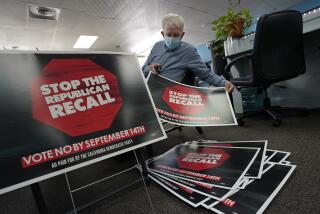Bid for Earlier State Presidential Primary Stalls
- Share via
SACRAMENTO — Gov. George Deukmejian and legislative leaders voiced wide disagreement Tuesday over whether California should move up the date of its presidential primary, dimming prospects that a bill ordering an earlier election will pass this year.
Deukmejian, during a closed-door meeting with party leaders from the Assembly and Senate, vowed that he would veto the early primary bill that is now pending in the Senate.
That bill, which has attracted national interest because it would give California significantly more clout in choosing the next President, calls for a consolidated presidential and state primary election to be held the first Tuesday in March, 1992.
Under the current system, California’s presidential primary is held the first Tuesday in June, which puts the state at the end of the nominating season. As a result, presidential nominations are usually locked up by the time Californians get a chance to vote on candidates for the nation’s highest office.
Because of the sharp differences expressed during the meeting in Deukmejian’s office, legislative leaders agreed to pass the early-primary bill out of the Senate Thursday, but only with the understanding that it would ultimately land in a two-house conference committee for further negotiations.
The chief point of disagreement is whether the presidential and state primary elections should be consolidated into one election or split into two.
Republicans want two elections, the presidential primary in March and the regular state primary in June. The bill, as it was approved by the Assembly last year, would have split the primaries. The bill was amended in the Senate to consolidate the two primaries into one.
Senate Republican leader Ken Maddy of Fresno said one concern is the length of time between March primaries for state offices and the November election. “It’s a long time to campaign, from March to November,” the GOP leader said after emerging from the meeting.
Assembly Republican leader Ross Johnson of La Habra said Deukmejian agreed, even if it means an extra $40 million or $50 million in costs to the state. Deukmejian “had always presumed that what we were talking about was two primary elections,” Johnson said.
Senate President Pro Tem David A. Roberti (D-Los Angeles) just as adamantly wants one primary. He argues that holding two elections would be costly in dollars and that voter interest would drop off in state elections without the draw of the presidential primary.
Maddy said he believes the differences lessen the chance of any kind of early primary bill being passed this year.
Roberti sounded a bit more optimistic. “Who knows? Maybe we can work something out,” the Senate leader told reporters after the meeting.
A Deukmejian spokesman, Deputy Press Secretary Tom Beerman, said, “Obviously, there is a lot of work that still needs to be done. The governor has expressed his concern. Let’s see what the conference committee comes up with.”
More to Read
Get the L.A. Times Politics newsletter
Deeply reported insights into legislation, politics and policy from Sacramento, Washington and beyond. In your inbox twice per week.
You may occasionally receive promotional content from the Los Angeles Times.










